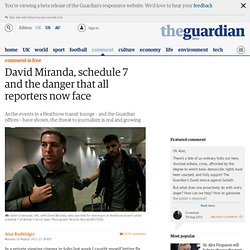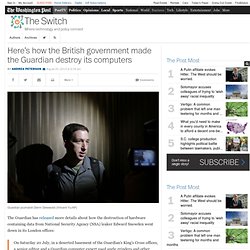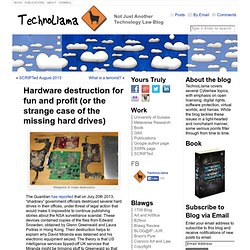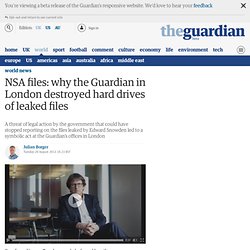

Smashed Hard Drives, Shuttered Email Services, And The Slow Leak Of Free Speech - TechCrunch. It can’t be easy defending the NSA’s surveillance efforts.

The task continues to be made increasingly difficult by the myriad revelations that continue to spill from the treasure trove of information that Edward Snowden released to the world. It’s just metadata. It’s just metadata on all phone calls. No they can’t call up your emails. Well, yes, XKeyscore is real, and you should be happy we have it. And no, there has been no harm to individuals. That last one is the most recent line of arguing I’ve run into, and I find it hard to fully understand. The cost of lost privacy is not fixed, and it is not always immediate. In the United States, we have a history with this specific bit of evil, perhaps best evinced in my view with the endlessly abused Espionage Act of 1917 and revoked mail privileges during World War I.
We can frame this in the form of a question: What would our reaction be if a foreign terrorist group had the ability to end privacy as we know it, and we then found out? David Miranda, schedule 7 and the danger that all reporters now face. In a private viewing cinema in Soho last week I caught myself letting fly with a four-letter expletive at Bill Keller, the former executive editor of the New York Times.

It was a confusing moment. The man who was pretending to be me – thanking Keller for "not giving a shit" – used to be Malcolm Tucker, a foul-mouthed Scottish spin doctor who will soon be a 1,000-year-old time lord. And Keller will correct me, but I don't remember ever swearing at him. Snowden NSA files: US and UK at odds over security tactics as row escalates.
UK must account for its actions to repress Guardian reporting on surveillance. Guardian's Alan Rusbridger: Airport Detention Was Best Moment To Reveal Government Intimidation. NEW YORK -– On Monday night, Guardian Editor-in-Chief Alan Rusbridger revealed how British authorities threatened the newspaper while it was reporting on documents leaked by former National Security Agency contractor Edward Snowden and even oversaw the destruction of computers that contained leaked materials.

What wasn’t clear in Rusbridger’s powerful first-person piece is why The Guardian waited nearly a month to expose government intimidation that’s since been widely condemned as an assault on the free press. Rusbridger told The Huffington Post that he could not originally discuss the property destruction, which took place July 20 before two security experts from British spy agency GCHQ, for “operational reasons. " “Having been through this and not written about it on the day for operational reasons, I was sort of waiting for a moment when the government’s attitude to journalism –- when there was an issue that made this relevant,” Rusbridger said. U.K. Ordered Guardian to Destroy Snowden Files Because Its Servers Weren't Secure. Former NSA contractor Edward Snowden.

Here’s how the British government made the Guardian destroy its computers. Guardian journalist Glenn Greewald (Vincent Yu/AP) The Guardian has released more details about how the destruction of hardware containing data from National Security Agency (NSA) leaker Edward Snowden went down in its London offices: On Saturday 20 July, in a deserted basement of the Guardian's King's Cross offices, a senior editor and a Guardian computer expert used angle grinders and other household tools to pulverise the hard drives and memory chips on which the encrypted files had been stored.As they worked, they were watched intently by technicians from the Government Communications Headquarters (GCHQ) who took notes and photographs, but who left empty-handed.

Hardware destruction for fun and profit (or the strange case of the missing hard drives) Weapons of mass destruction The Guardian has reported that on July 20th 2013, “shadowy” government officials destroyed several hard drives in their offices, under threat of legal action that would make it impossible to continue publishing stories about the NSA surveillance scandal.

These devices contained copies of the files from Edward Snowden, obtained by Glenn Greenwald and Laura Poitras in Hong Kong. Their destruction helps to explain why David Miranda was detained and his electronic equipment seized. The theory is that US intelligence services tipped-off UK services that Miranda might be bringing stuff to Greenwald so that he could continue publishing allegations. This seemed highly plausible to me, but I’ve been surprised to find considerable doubts throughout social media with regards to the veracity of the allegations.
B is clearly a PCI video card, probably a budget ATI Radeon like this: C is a PC motherboard, very difficult to identify the exact or approximate make. NSA files: why the Guardian in London destroyed hard drives of leaked files. Guardian editors on Tuesday revealed why and how the newspaper destroyed computer hard drives containing copies of some of the secret files leaked by Edward Snowden.

The decision was taken after a threat of legal action by the government that could have stopped reporting on the extent of American and British government surveillance revealed by the documents. It resulted in one of the stranger episodes in the history of digital-age journalism. On Saturday 20 July, in a deserted basement of the Guardian's King's Cross offices, a senior editor and a Guardian computer expert used angle grinders and other tools to pulverise the hard drives and memory chips on which the encrypted files had been stored. As they worked they were watched by technicians from Government Communications Headquarters (GCHQ) who took notes and photographs, but who left empty-handed.
Miranda was detained for nine hours under a section of legislation enacted in 2000 aimed at terrorists. "You've had your fun.